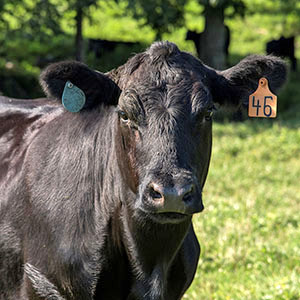UTIA Study Provides a Closer Look at Price Spread Concerns
Apr 10, 2023

Researchers from the University of Tennessee Institute of Agriculture and Mississippi State University teamed up to investigate the interaction of national slaughter and price spread — the difference between the value of live cattle price and wholesale boxed beef — that ensued following temporary closures of beef processing facilities in recent years.
When the COVID-19 pandemic caused temporary closures of U.S. cattle slaughter facilities, consumers were hit with increased beef prices, while beef producers felt the brunt of lower fed cattle prices. The temporary shutdown following Tyson’s beef packing plant fire in 2019 triggered a similar but less extreme reaction regarding price spread. These occurrences led to lingering concerns about market power in the beef industry and resulted in an investigation of anticompetitive behavior by meat packers.
“The beef price spread and slaughter numbers have historically been used as indicators of potential packer profitability, and some have questioned if packer slaughter is used to control the price spread,” said Charley Martinez, project lead and director of the UT Center of Farm Management. “Our study analyzes causal relationships between price spread and a weekly and Saturday slaughter capacity utilization measurement.”
The research found that while weekly and Saturday slaughter capacity utilization directly affect live cattle-to-box beef spread and vice versa, these causal relationships are not happening in all instances. The study shows that an increase in the price spread in the previous week positively impacts national Saturday slaughter capacity utilization when price spread for most of the timeframe analyzed, 2010-2021. This could suggest Saturday slaughter is more than a catch-up day of processing but could also be a strategy to increase slaughter when the price spread is increasing; however, further analysis found no statistical evidence of this occurring during the timeframe analyzed.
“While we do find these measurements interact with each other, we don’t find any statistical evidence that supports the notion that weekly or Saturday slaughter capacity utilization is used by beef packers to control the price spread,” said Martinez.
The study was conducted by Charley Martinez, Pengzhen Li, Christopher Boyer, and Edward Yu from the UT Department of Agricultural and Resource Economics, as well as Joshua Maples from the Department of Agricultural Economics at Mississippi State University. This one-year grant was funded by the Office of the Chief Economist, which serves as the focal point for economic and policy-related research and analysis for the U.S. Department of Agriculture.
For more content like this, check out the latest issue of The Cooperator.
When the COVID-19 pandemic caused temporary closures of U.S. cattle slaughter facilities, consumers were hit with increased beef prices, while beef producers felt the brunt of lower fed cattle prices. The temporary shutdown following Tyson’s beef packing plant fire in 2019 triggered a similar but less extreme reaction regarding price spread. These occurrences led to lingering concerns about market power in the beef industry and resulted in an investigation of anticompetitive behavior by meat packers.
“The beef price spread and slaughter numbers have historically been used as indicators of potential packer profitability, and some have questioned if packer slaughter is used to control the price spread,” said Charley Martinez, project lead and director of the UT Center of Farm Management. “Our study analyzes causal relationships between price spread and a weekly and Saturday slaughter capacity utilization measurement.”
The research found that while weekly and Saturday slaughter capacity utilization directly affect live cattle-to-box beef spread and vice versa, these causal relationships are not happening in all instances. The study shows that an increase in the price spread in the previous week positively impacts national Saturday slaughter capacity utilization when price spread for most of the timeframe analyzed, 2010-2021. This could suggest Saturday slaughter is more than a catch-up day of processing but could also be a strategy to increase slaughter when the price spread is increasing; however, further analysis found no statistical evidence of this occurring during the timeframe analyzed.
“While we do find these measurements interact with each other, we don’t find any statistical evidence that supports the notion that weekly or Saturday slaughter capacity utilization is used by beef packers to control the price spread,” said Martinez.
The study was conducted by Charley Martinez, Pengzhen Li, Christopher Boyer, and Edward Yu from the UT Department of Agricultural and Resource Economics, as well as Joshua Maples from the Department of Agricultural Economics at Mississippi State University. This one-year grant was funded by the Office of the Chief Economist, which serves as the focal point for economic and policy-related research and analysis for the U.S. Department of Agriculture.
For more content like this, check out the latest issue of The Cooperator.